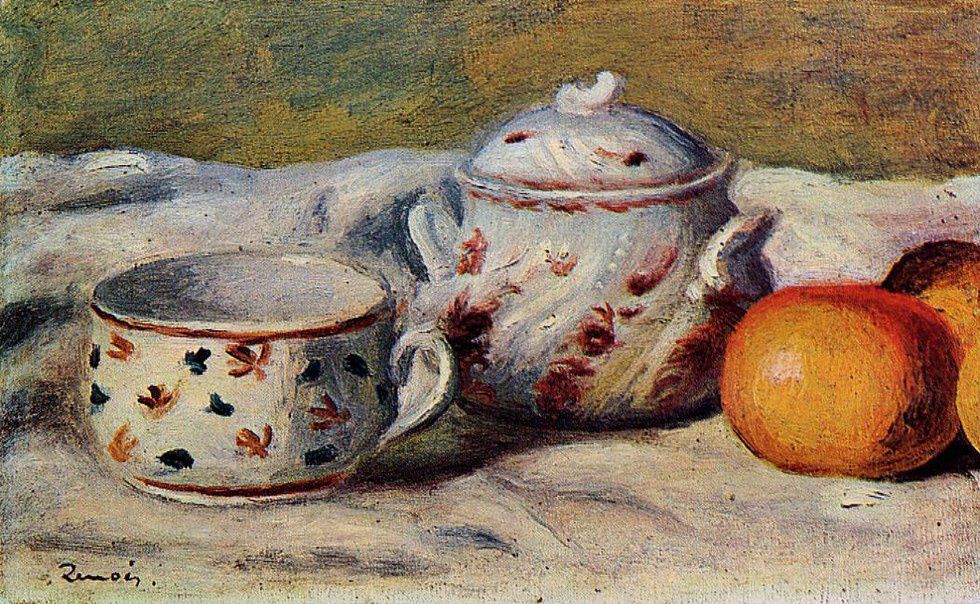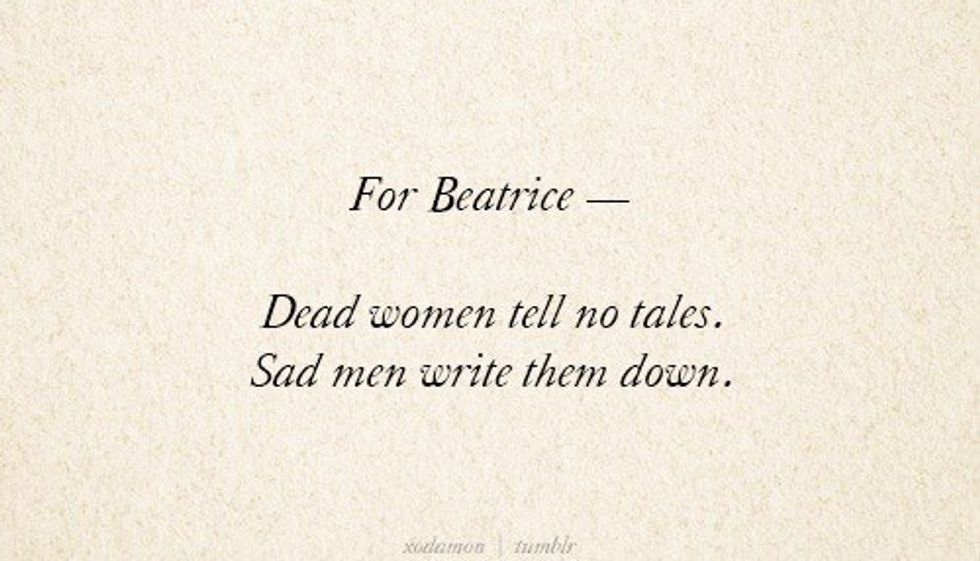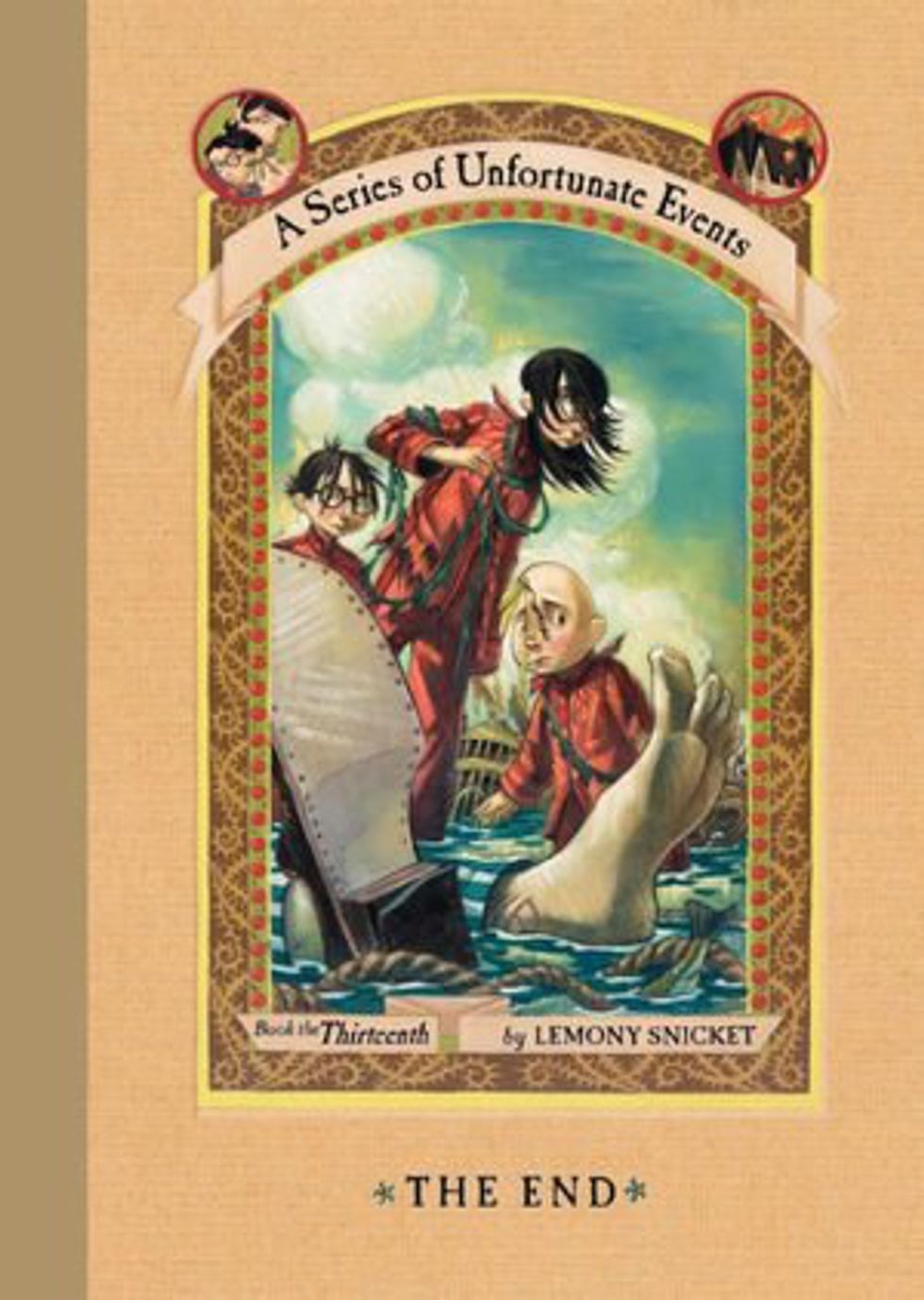This article is dedicated to anyone who has read "A Series of Unfortunate Events" and, like me, wasted many a childhood hour poring over its unsolved mysteries. If you’ve never read Lemony Snicket’s masterpiece of a series, stop reading this article immediately and pick up a copy of "The Bad Beginning" from the library.
One might think the books are too “young adult” for one’s college-educated mind, but rest assured that if you don’t read them you are missing out. The simultaneously dark and funny books provide universal truths that are relatable on so many levels, even though most of us aren’t orphans swept up in a whirlwind of mystery, arson, and never-ending new guardians.
When I started reading the series, the last two books (number 12, "The Penultimate Peril," and number 13, "The End") had yet to come out. I felt sure that these last two books would answer all of the questions posed in the preceding 11 books, but alas, not only did most of these mysteries remain unresolved, even more unfolded! So, without further ado, here’s a list of what I consider to be the most bewildering questions from "A Series of Unfortunate Events."
1. V.F.D.
Obviously, V.F.D. needs to be talked about. The acronym is first mentioned in "The Austere Academy," when Duncan and Isadora scream it to the Baudelaires as they are being whisked away by Count Olaf. The Baudelaire siblings attempt to decode what these three initials might stand for throughout the next few books, but frustratingly, it turns out that many, many things use the same initials. The Village of Fowl Devotees, for example, or Volunteers Fighting Disease.
It’s not until "The Slippery Slope" that it’s semi-confirmed by Quigley that the “real” V.F.D. stands for Volunteer Fire Department, a realization that is somewhat anticlimactic and still quite enigmatic. The Baudelaires learn that their parents, as well the majority of their other guardians—good or evil—were members of V.F.D., and that there was a schism that split the organization between volunteers and villains.
It’s always bugged me, however, that Lemony Snicket never comes right out and tells us that V.F.D. definitely stands for Volunteer Fire Department, or what caused the schism, or why the organization’s headquarters was burned down…or anything, really. Like why do all the members have the same disguise kit? And the same eye tattoo on their ankles? And if it’s a “volunteer” organization, why are the young recruits taken to the headquarters by their ankles? Sounds more like a cult than a fire department….
Photo/Illustration Credit: Brett Helquist
2. That Sugar Bowl
Ugh, ugh, ugh. I want to know SO BADLY why the sugar bowl is so important. It’s mentioned for the first time in "The Hostile Hospital" (Lemony Snicket muses if it was really necessary to steal it from Esmé Squalor years ago), and from then on out the sugar becomes an important part of the books. It’s evident that members on both sides of the V.F.D. schism want the sugar bowl, but no one really knows why. Captain Widdershins says in "The Grim Grotto," “It’s not the sugar bowl, it’s what’s inside it” (121) …BUT WE NEVER FIND OUT WHAT’S INSIDE IT. And also, the sugar bowl goes through some shit—it floats through the ocean into an underwater grotto, it’s carried through the air by some crows, and then it finally falls into a pond (we think)—and whatever the sugar bowl contains just magically stays put? I FIND THIS HARD TO BELIEVE, LEMONY.
Photo/Painting Credit: Pierre August-Renoir
3. The Poison Dart Story
So in "The Penultimate Peril" Kit Snicket tells the Baudelaires that one night long ago she smuggled a box of poison darts into an opera house…to give to the Baudelaires’ parents. Later on in the book, Klaus Baudelaire is helping Count Olaf break into a room locked with a device that requires the answers to three different questions to be typed in, in order for it to open. The second question is this: what weapon left Count Olaf an orphan? “Count Olaf gave Klaus a slow smile that made the Baudelaires shudder. ‘Certainly I’ll tell you,’ he said. ‘It was poison darts’” (308). Hmmm. I’m no detective but this sounds pretty fishy to me, since poison darts aren’t exactly the most common murder weapon. So the question remains—did the Baudelaire parents really murder Count Olaf’s parents? And why? It certainly would explain Olaf’s desire to wreak constant havoc on the Baudelaire orphans’ lives.
Photo Credit: Jowra.com
4. Beatrice
OK, so we careful readers all know that Beatrice is the Baudelaires' mother. But this is something that really boggles my mind. From the beginning of the series, we know that Beatrice is a (dead) woman with whom Lemony Snicket was in love via his two line dedication to her at the start of each book, but we definitely do not know that she is also the Baudelaire’s mother until the very last line of the very last book (appropriately titled "The End"). The weird twist on this whole situation is that Lemony Snicket was most definitely NOT the Baudelaire’s father (we find out that their father’s name was Bertrand). So…why did Beatrice marry Bertrand instead of Lemony? Why is he still in love with her after she married another man, had three children with said man, and then died in a fire? Beatrice must have been a real catch.
Photo Credit: Tumblr.com (quote by Lemony Snicket)
5. The Question Mark
This one really lives up to its name. In "The Grim Grotto," the Baudelaires are watching the sonar radar on their submarine, and they see two figures detected nearby—one is Count Olaf’s octopus-shaped submarine, and the other is a huge question mark-shaped…something. Then, at the end of the book, the Baudelaires see the thing through the porthole of their submarine—or at least its shadow. Lemony Snicket says “They could not tell, just as I will not tell, if it was some horrifying mechanical device, such as a submarine, or some ghastly creature of the sea” (311).
Snicket precedes this statement with a whole long paragraph about how some things are just not meant to be known, yadda yadda yadda. In the last book, the Baudelaires find out that their good friends the Quagmire triplets were swallowed up by the question mark along with a bunch of other people. But, unsurprisingly, WE NEVER FIND OUT WHAT THE QUESTION MARK IS. Nope. Never. If I had to pick one question to be answered in this story, it would be this one. Obviously it’s something sinister, and obviously whatever fate befalls the Quagmires & co is not pleasant, but I really would love to know the specifics. GRRR.
Photo/Illustration Credit: Brett Helquist
6. The Island
The Baudelaires wash up on this mysterious island in "The End" that for some reason seems to be a very popular destination for V.F.D. members, which the Baudelaires find out through Kit Snicket and a book of journal entries detailing their parents’ life history that happens to be on the island with them. We are lead to believe that the Baudelaires find out the answers to a good many mysteries in this book, but of course that information isn’t relayed to the reader. I don’t mean to force you, Lemony Snicket, but I think you should publish a copy of this book for the general public.
But I digress. Everything about this island is mysterious, from the fact that “everything eventually washes up on its shores,” to the fact that the islanders are living in a constant happy coconut cordial-induced, overseen by the “facilitator” of the island, Ishmael, and far away from the world’s troubles. I just want to know what this place is, who the islanders are, and why the whole series ends on this island like an episode of "Lost" for God’s sake.
Photo/Illustration Credit: Brett Helquist
I could probably write my own book called Things That Piss Me Off About A Series of Unfortunate Events with all of the questions I have about this series. I’ll keep it to just these six, though, since I think they’re the ones that puzzle me the most. It’s pretty likely that we’ll never find out the answers, which is disheartening to the point that I sort of want to bang my head against the wall screaming WTF LEMONY, but certainly not a reason to not read the series. To be honest I think all of the mysteries are what makes the books so good; the dark secrets give Lemony Snicket’s cynical humor and outlandish plots an edge. I suppose that at the end of the day, books that keep you thinking are the best kind. And remember:
“No matter who you are, no matter where you live, and no matter how many people are chasing you, what you don't read is often as important as what you do read.”
~Lemony Snicket
P.S. Watch this awesome teaser trailer released last year. Rumor has it Netflix is going to make an "A Series of Unfortunate Events" TV show (which may or may not be true), but either way this trailer is awesome.


























